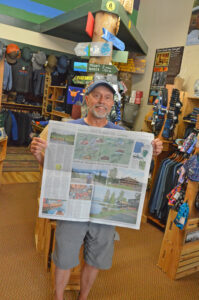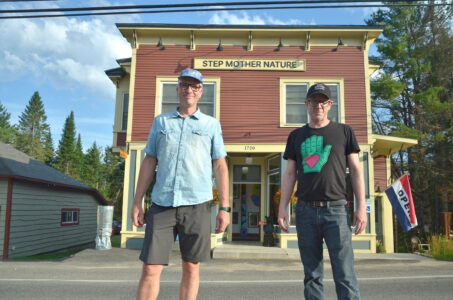‘Tell stories, write history’
Managing editor leaving Enterprise
- Elizabeth Izzo, who has been the Enterprise’s managing editor for three years and a writer with the paper since 2019, is leaving the paper today ahead of starting a job with the Albany Times Union next month. (Enterprise photo — Aaron Marbone)
- Adirondack Daily Enterprise Managing Editor Elizabeth Izzo edits a news story while taking a call in her office at the Enterprise newsroom in Saranac Lake Monday. (Enterprise photo — Aaron Marbone)

Elizabeth Izzo, who has been the Enterprise’s managing editor for three years and a writer with the paper since 2019, is leaving the paper today ahead of starting a job with the Albany Times Union next month. (Enterprise photo — Aaron Marbone)
SARANAC LAKE — Elizabeth Izzo, who has been the Enterprise’s managing editor for three years and a reporter here since 2019, will serve her last day in the editor’s chair today.
Izzo, 29, will be taking a job with the Albany Times Union as a news editor in October.
Her reporting carried the newspaper through the coronavirus pandemic and her leadership has elevated countless stories and helped craft the next generation of voices to keep the Tri-Lakes informed.
“We are excited for Elizabeth that she has this opportunity to take her award-winning journalism to the next step in her career at the Times Union in Albany,” Enterprise Editor/Publisher Andy Flynn said. “She shines when it comes to journalistic ethics and keeping governments accountable and transparent. We wish her all the best.”
As a writer, Izzo was fierce and fast. In her first year here, she wrote 800-plus stories. On Oct. 5, 2019, she had seven stories published in the Enterprise — all written on deadline the previous day after a visit from then-Lt. Gov. Kathy Hochul.

Adirondack Daily Enterprise Managing Editor Elizabeth Izzo edits a news story while taking a call in her office at the Enterprise newsroom in Saranac Lake Monday. (Enterprise photo — Aaron Marbone)
Her stories were as varied as the people they were about. One evening in November 2019, Izzo was covering a beard contest at Lisa G’s in Lake Placid marking the end of “Movember” when she got a call that the Whiteface Mountain Midstation Lodge was on fire. She rushed over, going from shooting whiskers to fire within minutes, and was the only reporter on scene to capture the building’s last minutes as it was engulfed by flames. This is just one of the many days she spent covering the best and worst of the day’s events.
As editor, she became methodical and focused on the big picture. It was her duty to shape the mission and the content of the paper. She kept the paper focused on a variety of topics — hard news, investigations, community support, breaking news, generational issues and genuine entertainment. This all took countless split-second and long-thought-out decisions.
She has been responsible for much of what runs in the paper, writing editorials, designing pages and editing stories, press releases and letters to the editor.
Izzo has always been a wiz with government budgets, diving in and understanding them to explain them to the public while always keeping in mind that all those numbers represent priorities and people, and those people need a voice.
Since the start, she has been adamant that the newspaper focus on people — all people — not just the ones with an important title.
–
Comics and obits
–
Izzo grew up in Peru, reading the Plattsburgh Press-Republican. Every Sunday, she’d split the paper with her parents. At first, she read for the comics. But eventually, the news sections drew her in. She had always loved to write. From the moment she could hold a pencil, she said she would scribble nonsense words on perforated computer paper.
She remembers being a child, curious about the world but always getting the sense that her opinions didn’t matter because she lacked experience or knowledge. As an adult, she said she has seen people with power use that same sense of uncertainty to their benefit.
“I’ve seen how people with power and influence use complexity of topics, use bureaucracy, use other people’s lack of experience … to their advantage,” she said.
If those complexities are explained, she said people feel more confident in holding and voicing their opinions. She views the newspaper as a forum for people to share their opinions and a community service that holds power to account.
When Izzo was 13, her father died by suicide. There are so many reasons why she writes, but one of the biggest reasons is to show people that their lives and their impact matters.
“Something about experiencing grief at an age like that is it’s extremely alienating,” she said. “When my father died, it was jarring because it felt like the world kept going and someone who had meant so much to me was nothing to everybody else.”
She doesn’t want anyone to feel that. Izzo said she finds the hyper-local journalism of the Enterprise incredibly meaningful.
“A lot of people are only in the newspaper when they’re born and when they die,” she said. “We get to be there for all the stuff in-between, too.”
The stories she thinks about most after they publish are the obituaries. These are stories where she talks with the friends and family of a person who has died to share their story with the community, allowing the community to grieve together. In Izzo’s second month at the Enterprise, she spoke to the family of Brittany Barney, a woman who died in a fire in Wilmington. The next month, she was speaking with the family, friends and constituents of the influential Wilmington town supervisor Randy Preston, who died of cancer.
Izzo said these stories are sad but important. She wrote about Bryce Laughlin, a 22-year-old who moved to Lake Placid during the height of the coronavirus pandemic and died within weeks of complications from COVID-19. At the time, in early 2021, there was a lot of reporting on statistics — counting the cases, deaths, hospital beds and test kits. Laughlin’s family gave her a glimpse into the real impact of the pandemic — the people behind the numbers.
“This is a person who had an entire life behind them and had an entire life before them,” Izzo said.
Some hit closer to home than others. It still hurts for her to talk about Josh Collins, an Enterprise newspaper carrier who died after being hit by a truck while riding his bicycle. Izzo said even though she knew Collins through work, she learned more about him by speaking to his friends and family while writing about his death than she’d known before.
–
Finding her place
–
Though she always loved reading newspapers, for a long time, Izzo did not believe she had a place in journalism.
“Because I didn’t see myself reflected in it,” she said.
As a woman from a lower-income family, she felt she did not see many people like her in the news.
Izzo started writing music and album reviews at 16, blending her love for writing with her love for the music of the 1960s like the Beatles or Simon and Garfunkel. But she still didn’t consider herself a journalist. She wrote freelance as she worked day jobs at nursing homes and grocery stores. The field of journalism wasn’t accessible to her, she believed.
When she was 18, she moved to Vermont for the music scene, started her own folk music magazine, “Torrent,” crowdfunded for the first edition, sold ads and managed writers. A co-worker at a grocery store she worked at suggested she apply to the local newspaper. She considered this idea “ridiculous” at the time, but it stuck in her mind.
When she moved back to Plattsburgh, she threw in an application to the Sun Community News and landed a job as an arts columnist and that led to a news clerk position. The editors saw something in her and she started getting sent out on assignments.
In 2016, Izzo became a staff reporter and started covering Plattsburgh City Hall.
“I just loved it. It became my whole life,” Izzo said. “I became the sort of person who, when I went on vacation, I’d visit newsrooms in other states.”
Izzo said she took a roundabout way into journalism. She was trained by mentors. When her “incredible” mentor at the Sun, Pete DeMola, left the paper in 2019, she went looking for another one. She had heard good things about Peter Crowley, then the managing editor at the Enterprise.
After landing a staff writer job here covering Lake Placid, she said moving to town allowed her to experience the things she would be writing about every day. The housing crisis in 2019 was bad and it’s bad now, she said.
After reporting for two years — including as the Enterprise’s health reporter during the early and peak days of the pandemic — she, like the rest of the world, was coming out of a difficult period when Crowley left the Enterprise. She had another decision to make.
“Was I going to seek another mentor or was I going to become the mentor?” Izzo asked.
She became a mentor in 2021.
Izzo said she still sometimes feels like an imposter. She still doesn’t know if there’s a place for her in journalism, but she said she has found a home and a family in it. This contradiction confuses her.
That’s part of the mindset, she said. One of Izzo’s favorite daily journalism adages is that “every day you start from zero.” She’s always focused on improving, never ready to rest on her laurels.
Izzo said her focus on covering the diversity of the region as the paper’s editor ties back to her not seeing herself reflected in the industry when she was a reader. She said the paper should reflect the community — all of it.
“Stories weren’t being told,” she said. “When I was growing up in this region, there was an unspoken feeling, or culture, that ‘You may be different, but we’re not going to discuss that.’ But I think that the more we discuss those differences, the less scary those differences are.”
–
Community
–
Izzo has always read and admired the Times Union. It is a paper she’s aspired to be a part of, but never thought she would be. Preparing to be part of its staff is “surreal,” she said.
She said she will always have a deep love for the Enterprise. It is a unique newspaper to her.
“We take the job very seriously, but we don’t take ourselves too seriously,” she said.
The paper has a sense of humor, a willingness to admit when it gets something wrong and is a true reflection of the community, she said.
“We are so lucky to be in a community that supports us and really values good journalism. Actually, this community holds us accountable. I love that,” Izzo said.
The Enterprise has changed since she was hired in 2019. At that time, there were twice as many people working in newsroom and production as there are now. But she said she took on the editor role in part because she wanted to preserve the culture and the mission here.
“The Enterprise does impactful community journalism despite the limited resources,” Izzo said. “The Enterprise has a bright future because of the community it serves.”
She said she learned what it truly means to be a neighbor here.
“Being a community journalist, you have to be fair. You have to be honest. And you have to be OK with writing the truth about someone and seeing them in the grocery store the next day,” she said.
Looking back at everything she’s done at the Enterprise is “overwhelming,” Izzo said. She saw a pandemic start and end; she has been shaped by mentors, critics and friends; and covered everything from vandalism-by-hot dogs to government corruption.
She said the job is about writing history as it happens.
“(Journalism) is not glamorous, the pay is not glamorous, the hours are not glamorous and there are a lot of people who would rather we not write about them,” Izzo said. “But it matters.
“Tell stories, write history and hold people with power to account,” she said. “Ultimately, we all just want the world to be a better place.”






